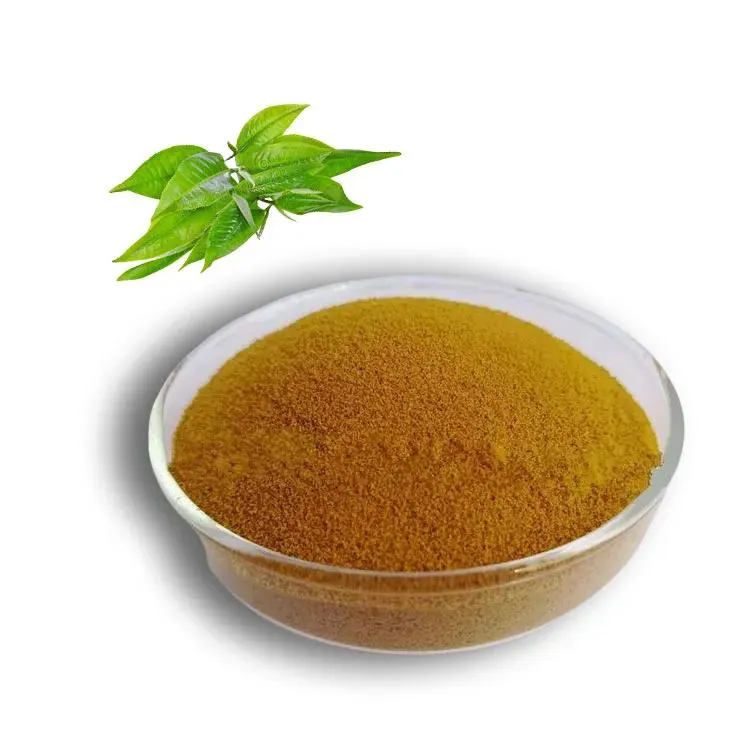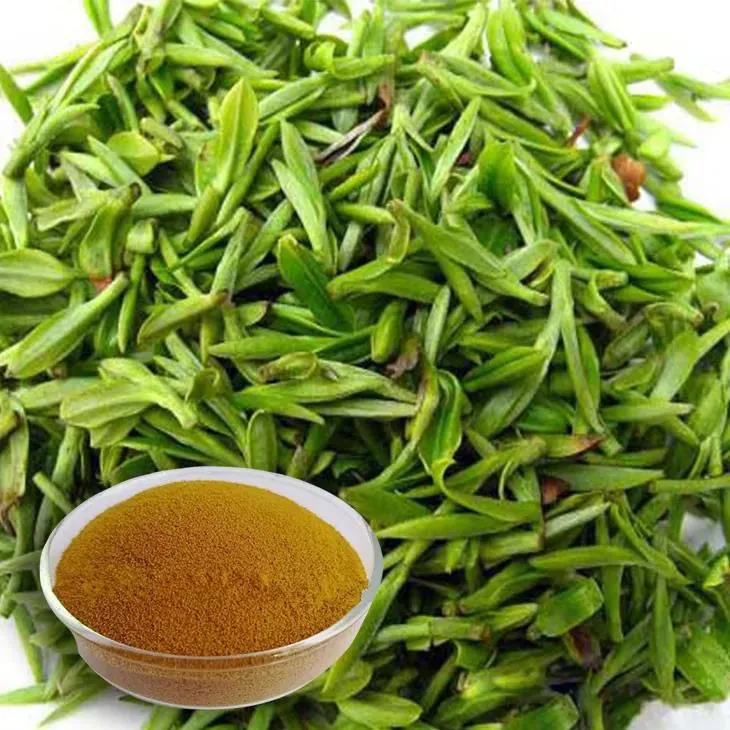- 0086-571-85302990
- sales@greenskybio.com
Green Tea Extract: Benefits and Consumption Guide
2024-11-13

I. Introduction
Green tea has been a staple in many cultures for centuries, not only for its refreshing taste but also for its potential health benefits. Green Tea Extract, which is concentrated from the leaves of the Camellia sinensis plant, has gained significant popularity in recent years. It is a rich source of bioactive compounds, most notably catechins, which are powerful antioxidants. In this comprehensive guide, we will explore the various benefits of Green Tea Extract and provide guidelines on how to consume it properly.

II. The Benefits of Green Tea Extract
1. Antioxidant Properties
Green tea extract is renowned for its high antioxidant content. Catechins, especially epigallocatechin - 3 - gallate (EGCG), are the main antioxidants in green tea. These antioxidants play a crucial role in neutralizing free radicals in the body. Free radicals are unstable molecules that can cause oxidative stress, which is linked to various diseases such as cancer, heart disease, and neurodegenerative disorders. By scavenging free radicals, green tea extract helps protect cells from damage and may reduce the risk of developing these chronic diseases.
2. Heart Health
There are several ways in which green tea extract can benefit heart health. Firstly, it may help lower blood pressure. Some studies have shown that the catechins in green tea can relax blood vessels, leading to a reduction in blood pressure levels. Secondly, it has been associated with improving lipid profiles. Green tea extract may lower levels of LDL (low - density lipoprotein) cholesterol, also known as "bad" cholesterol, while increasing levels of HDL (high - density lipoprotein) cholesterol, or "good" cholesterol. This balance is essential for maintaining a healthy cardiovascular system. Additionally, green tea extract has anti - inflammatory properties, which can further contribute to heart health by reducing inflammation in the blood vessels.
3. Weight Management
For those looking to manage their weight, green tea extract may offer some assistance. It has been suggested that catechins in green tea can increase thermogenesis, which is the process by which the body generates heat and burns calories. This thermogenic effect may help boost metabolism, allowing the body to burn more calories at rest. Moreover, green tea extract may also help suppress appetite. Some studies have shown that it can reduce feelings of hunger and increase satiety, which can lead to a reduction in overall calorie intake.
4. Brain Health
The antioxidants in green tea extract may also have a positive impact on brain health. Oxidative stress and inflammation in the brain are associated with neurodegenerative diseases such as Alzheimer's and Parkinson's. By reducing oxidative stress, green tea extract may help protect brain cells from damage. Additionally, some research suggests that green tea extract may improve cognitive function, including memory, attention, and concentration. It may also have a neuroprotective effect, potentially delaying the onset of age - related cognitive decline.
5. Cancer Prevention
While more research is needed, there is some evidence to suggest that green tea extract may play a role in cancer prevention. The antioxidants in green tea, particularly EGCG, have been shown to have anti - cancer properties in laboratory studies. They can inhibit the growth and spread of cancer cells by interfering with various cellular processes. Some epidemiological studies have also found an association between green tea consumption and a reduced risk of certain types of cancer, such as breast, prostate, and colorectal cancer. However, it is important to note that green tea extract should not be considered a substitute for conventional cancer treatments.
6. Skin Health
Green tea extract can also benefit skin health. The antioxidants in it can protect the skin from damage caused by free radicals, such as those from ultraviolet (UV) radiation and environmental pollutants. This can help prevent premature aging of the skin, including the formation of wrinkles and fine lines. Additionally, green tea extract has anti - inflammatory properties that can be beneficial for treating skin conditions such as acne and eczema. It may also help improve skin elasticity and complexion.

III. How to Consume Green Tea Extract
1. Green Tea Extract Supplements
Green tea extract is available in supplement form, such as capsules, tablets, and powders. When choosing a supplement, it is important to look for a high - quality product. Check for products that are standardized to contain a certain percentage of catechins, preferably EGCG. Follow the recommended dosage instructions on the product label. However, it is advisable to consult a healthcare professional before starting any new supplement, especially if you have any underlying health conditions or are taking medications, as green tea extract may interact with certain drugs.
2. Green Tea Beverages
- Traditional green tea is a great way to consume green tea extract. To make a cup of green tea, use about 1 - 2 grams of loose - leaf green tea per 8 - ounce cup of water. Boil the water and let it cool slightly (around 160 - 180°F) before pouring it over the tea leaves. Steep the tea for 2 - 3 minutes for a mild flavor or up to 5 minutes for a stronger flavor. Avoid over - steeping, as it can make the tea bitter.
- There are also many ready - to - drink green tea products available in the market. However, be aware that some of these may contain added sugars or other additives. Look for unsweetened or minimally sweetened options to get the pure benefits of green tea.
3. Incorporating Green Tea Extract into Food
Green tea extract can be incorporated into various foods. For example:
- Green tea - flavored ice cream or yogurt can be a delicious way to enjoy the benefits of green tea while satisfying your sweet tooth. However, these products may also contain added sugars and fats, so consume them in moderation.
- Green tea powder can be added to smoothies. Combine it with fruits, vegetables, and a liquid base such as water or almond milk for a nutritious and refreshing drink. This is a great option for those who may not like the taste of traditional green tea.

IV. Precautions and Side Effects
1. Caffeine Content
Green tea contains caffeine, and so does green tea extract. While the caffeine content in green tea is generally lower than that in coffee, it can still cause side effects in some people. Excessive caffeine intake may lead to symptoms such as jitters, insomnia, increased heart rate, and digestive problems. People who are sensitive to caffeine should be cautious when consuming green tea extract and may need to limit their intake or choose a decaffeinated version.
2. Interactions with Medications
Green tea extract may interact with certain medications. For example, it can interfere with the absorption of some drugs, such as blood thinners and medications for high blood pressure. It may also increase the risk of side effects when taken with some medications. Therefore, it is crucial to inform your healthcare provider if you are taking green tea extract, especially if you are on any prescription medications.
3. Allergic Reactions
Although rare, some people may be allergic to green tea or its components. Allergic reactions can range from mild symptoms such as itching and hives to more severe reactions like difficulty breathing and anaphylaxis. If you experience any signs of an allergic reaction after consuming green tea extract, seek medical attention immediately.
V. Conclusion
Green tea extract offers a wide range of potential health benefits, from antioxidant protection to support for heart health, weight management, brain health, and more. However, it is important to consume it properly and be aware of the potential precautions and side effects. Whether you choose to consume green tea extract through supplements, beverages, or food, incorporating it into your lifestyle in a balanced way can be a great way to enhance your overall health. As always, if you have any concerns or questions about green tea extract, consult a healthcare professional.
FAQ:
What are the main antioxidants in green tea extract?
The main antioxidants in green tea extract are catechins. Catechins are a type of flavonoid and are highly effective in combating oxidative stress in the body. They play a significant role in protecting cells from damage caused by free radicals, which are associated with various diseases and the aging process.
How does green tea extract help in reducing the risk of diseases?
Green tea extract helps in reducing the risk of diseases mainly through its antioxidant properties. The catechins in it can neutralize free radicals, which are unstable molecules that can damage cells and DNA. By reducing oxidative stress, it may lower the risk of chronic diseases such as heart disease, cancer, and neurodegenerative disorders. Additionally, it may have anti - inflammatory effects that also contribute to disease prevention.
Can green tea extract aid in weight loss?
There is some evidence that green tea extract may aid in weight loss. It may increase the body's metabolism, which helps the body burn more calories at rest. Some studies suggest that the catechins in green tea extract can enhance fat oxidation. However, it is not a magic solution for weight loss, and should be combined with a healthy diet and regular exercise for best results.
What is the proper way to consume green tea extract?
The proper way to consume green tea extract can vary. It is often available in supplement form, such as capsules or tablets. When taking supplements, it is important to follow the recommended dosage on the product label. Green tea extract can also be consumed in the form of green tea itself. Brewing green tea and drinking it regularly can provide the benefits. However, excessive consumption should be avoided as it may lead to side effects such as stomach upset or insomnia in some cases.
Are there any side effects of consuming green tea extract?
Yes, there can be side effects of consuming green tea extract. In some people, it may cause stomach upset, nausea, or diarrhea. Green tea also contains caffeine, so excessive consumption may lead to symptoms like insomnia, jitteriness, and increased heart rate. Pregnant or breastfeeding women should be especially cautious as high levels of green tea extract may have potential risks for the fetus or infant.
Related literature
- The Health Benefits of Green Tea Extract: A Review"
- "Green Tea Extract and Disease Prevention: Current Evidence"
- "Proper Consumption of Green Tea Extract: Guidelines and Considerations"
- ▶ Hesperidin
- ▶ citrus bioflavonoids
- ▶ plant extract
- ▶ lycopene
- ▶ Diosmin
- ▶ Grape seed extract
- ▶ Sea buckthorn Juice Powder
- ▶ Beetroot powder
- ▶ Hops Extract
- ▶ Artichoke Extract
- ▶ Reishi mushroom extract
- ▶ Astaxanthin
- ▶ Green Tea Extract
- ▶ Curcumin Extract
- ▶ Horse Chestnut Extract
- ▶ Other Problems
- ▶ Boswellia Serrata Extract
- ▶ Resveratrol Extract
- ▶ Marigold Extract
- ▶ Grape Leaf Extract
- ▶ blog3
- ▶ blog4
- ▶ blog5
-
Organic Tongkat Ali extract powder factory.
2024-11-13
-
How to make powder with ashwagandha extract.
2024-11-13
-
Rosehip extract manufacturers from China.
2024-11-13
-
The best cat's claw extract in nature.
2024-11-13
-
Chinese Dandelion Leaf Extract Suppliers.
2024-11-13
-
Polygonum Cuspidatum Extract
2024-11-13
-
Fig Extract
2024-11-13
-
Soy Extract
2024-11-13
-
Lemon Balm Extract
2024-11-13
-
Polygonum multiflorum extract
2024-11-13
-
Uridine-5'-monophosphate Disodium salt
2024-11-13
-
Epimedium extract powder
2024-11-13
-
Golden Seal Extract
2024-11-13
-
Carrageenan Extract Powder
2024-11-13
-
Mulberry leaf Extract
2024-11-13





















